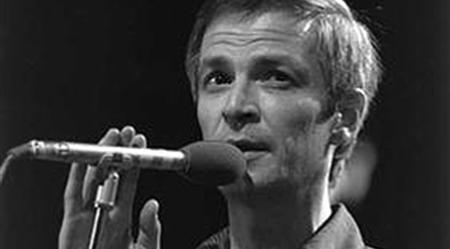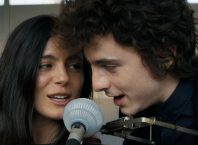“The high ones die, die. They die, you look up and who’s there?” John Berryman – Dream Song 36

Arik Einstein died last night. He is gone, but his presence is everywhere. I hear his voice on the radio in song after song, and online everyone is sharing their sadness, memories and favorite songs.
Singer, songwriter and actor, Arik Einstein always seemed to go his own way, and yet somehow through this, he gave voice to the feelings of so many people. There are poems in Hebrew that I know will always come to me in the voice of Arik Einstein, at times deep and powerful, at times so tender, the words floating on air, as in this version of Avraham Chalfi’s “Atur Mizhech” (music: Yoni Rechter) sung by Arik Einstein with Yehudit Ravitz and Korin Alal, with Avner Kanner on piano.
Yet he also brought the world and the rock revolution into Israeli song, with covers of The Beatles’ Here There and Everywhere, and Tim Hardin’s Reason to Believe, and making music that had a different sound, one that had not been heard here before. Although they disbanded after just one year and one album, The High Windows (Shmulik Kraus, Josie Katz and Arik Einstein) merged pop and Hebrew songs from Hanoch Levin’s Chocolate Soldier, to poet Rachel’s Zemer Nuge and the children’s poem Buba Zehava (The doll Zehava) by Miriam Yellin Shteklis, that have become part of the Israeli collective consciousness. His collaboration with the Churchills began on his third album Poozy (1969), is considered to be the first rock album in Hebrew, and his collaborations with Shalom Hanoch, Miki Gavrielov and Uri Zohar all have their place in the Israeli cultural canon.
Arik Einstein’s was a voice that came from deep within, touching something essentially Israeli, and yet also looking outward – which is, perhaps essentially Israeli. In his modest demeanor, his casual, almost diffident stage presence, there was a simple integrity: a love of music, and the desire to sing. There was also the desire to say something, Arik Einstein wrote the lyrics to some of his best known songs. When I hear Ani VeAta Neshane et HaOlam (music: Miki Gabrielov) sung so simply and without pathos, I feel as if I am sitting with some of my best friends, and this just happens to be something that one of my friends is saying, a friend who knows how to give words to the secret feelings and unspoken dreams of everyone in the room: you and I, together, we will change the world.
Arik Einstein did change the world, this world is a better place because we have his music. Listening to his songs this morning after his death, they seem to take on a new meaning. It’s like the twist at the end of a story that makes you turn back and look at everything differently. For today, at least, there is a feeling of sadness in every song I hear, even the funny ones.
Arik Einstein (January 3, 1939 – November 26, 2013)





